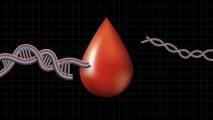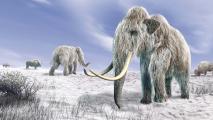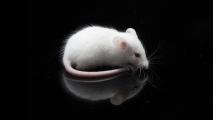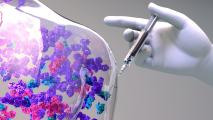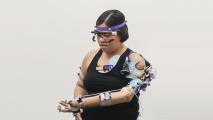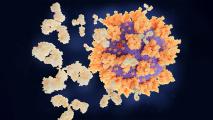
Biotech
Human history has been all but defined by death and disease, plague and pandemic. Advancements in 20th century medicine changed all of that. Now advancements in 21st century medicine promise to go even further. Could we bring about an end to disease? Reverse aging? Give hearing to the deaf and sight to the blind? The answer may be yes. And soon.
More
A malaria antibody prevented infections in purposefully-infected volunteers
In a small study, researchers found an antibody that prevents malaria infection in people purposefully infected with the parasite.
Johns Hopkins has developed a lung cancer blood test
Researchers at Johns Hopkins are using AI to power a lung cancer blood test.
Want better nasal vaccines? Look to the bacteria in your nose.
Researchers are investigating the link between the bacteria inside your nose and how effective nasal vaccines can be.
FDA approves COVID-19 boosters for seniors, high-risk groups (Updated)
The FDA has expanded its authorization of COVID-19 boosters of Pfizer’s vaccine to include seniors and people in high-risk populations.
New portable blood test kit is cheap, fast, and accurate
A new blood test kit that’s fast, portable, and accurate could help bring better healthcare to people in remote and underdeveloped areas.
Pfizer says its COVID-19 vaccine works in kids
New trial results suggest Pfizer’s COVID-19 vaccine works in kids between the ages of 5 and 11, safely triggering a robust antibody response.
Can the woolly mammoth save Siberia from climate change?
Harvard geneticist George Church’s new de-extinction startup aims to resurrect the woolly mammoth to help combat permafrost thaw.
Trial of opioid vaccine launches in US
An opioid vaccine that prevents people with opioid use disorder from feeling “high” when they take oxycodone is moving to human trials.
How we doubled our life expectancy in the last 100 years
“The idea of taking a pill and getting better is actually a very recent invention.”
mRNA cancer treatment shrinks tumors in mice
An mRNA cancer treatment in human trials has proven incredibly effective in mice, shrinking tumors in 85% of the rodents tested.
This implanted microchip may one day control your sleep
An implantable, wireless device could be better than popping a pill.
Moderna’s new vaccine targets COVID-19, the flu, and RSV
Moderna is developing a combination vaccine to protect against COVID-19, seasonal influenza, and respiratory syncytial virus.
New bionic arm is incredibly close to the real thing
A new bionic arm is so intuitive, wearers think and behave like people without amputations while using it to perform everyday tasks.
Molecular farming could be the future of vaccines
Edible plant-based vaccines could revolutionize how we fight diseases.
Study: COVID-19 booster shots dramatically reduce infection risk
A large COVID-19 booster shot study in Israel found that a third dose significantly increased seniors’ protection against the coronavirus.
Forensic scientists continue mission to identify 9/11 victims
Forensic scientists have identified two more 9/11 victims and will soon use next-generation sequencing to analyze unidentified remains.
UK researchers are growing the Delta variant for human challenge trials
Responding to the variant’s rise, UK researchers are growing the Delta variant for trials.
A blood test for your circadian clock
Your circadian clock controls more than when you sleep and wake. Researchers are developing a simple blood test to try and accurately tell your time.
Cambridge researchers have created a mathematical model for building muscle
Now there’s a mathematical model that could maximize the effectiveness of exercise.
One antibody stops all strains of COVID-19 from infecting cells
A newly discovered antibody can neutralize all strains of COVID-19 and every other sarbecovirus known to infect humans.
Get inspired with the most innovative stories shaping the world around us.

















